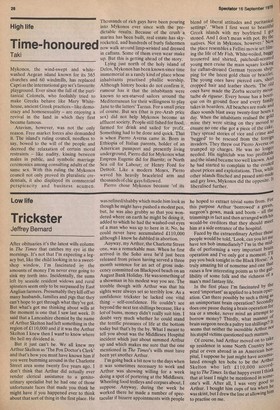High life
Time-honoured
Talc!
Mykonos, the wind-swept and whitewashed Aegean island known for its 365 churches and 60 windmills, has replaced Capri as the international gay set's favourite playground. Ever since the fall of the puritanical Colonels, who foolishly tried to make Greeks behave like Mary Whitehouse, ancient Greek practices — like democracy and homosexuality — are enjoying a revival in the land in which they first became famous.
Atavism, however, was not the only reason. Free market forces also demanded it. The island's ruling council, needless to say, bowed to the will of the people and decreed the relaxation of certain moral restraints — like nudity, kissing between males in public, and symbolic marriage ceremonies among consulting adults of the same sex. With this ruling the Mykonos council not only proved its pluralistic credentials, it also displayed its commercial perspicacity and business acumen. Thousands of rich gays have been pouring into Mykonos ever since with the predictable results. Because of the crush a marina has been built, real estate has skyrocketed, and hundreds of burly fishermen now walk around limp-wristed and dressed in caftans. Some of them even wear make up. But this is getting ahead of the story.
Lying just north of the holy island of Delos, Mykonos has been known since time immemorial as a randy kind of place whose inhabitants practised phallic worship. Although history books do not confirm it, rumour has it that the inhabitants were known to sex-starved sailors around the Mediterranean for their willingness to play Jane to the latters' Tarzan. For a small price of course. But sex (that is pre-Arab price sex) did not help Mykonos become an affluent society. People still fished for food, farmed for drink and sailed for profit. Something had to be done and quick. That is when Pierro Aversa came in. Born in Ethiopia of Italian parents, holder of an American passsport and presently living underground, Pierro did for Mykonos what Empress Eugenie did for Biarritz; or North Sea oil for Labour; or Henry Ford for Detroit. Like a modern Moses, Pierro waved his heavily braceleted arm and thousands of chic gays followed.
Pierro chose Mykonos because 'of its blend of liberal attitudes and puritanical settings'. 'When I first went to beautiful Greek islands with my boyfriend I got stoned. And I don't mean with pot. By the natives. Not in Mykonos, however.' NO the place resembles a Fellini movie set filming the life of Mr Fish. White-voiled, NOY trousered and shined, patchouli-scented young men cruise the main square looking for caftan-dressed German tycoons shor ping for the latest gold chain or bracelet. The young ones have pierced ears, short, cropped hair and leather shorts. The 010 ones have made the Zorba security mous: tache de rigueur. Every house has a bounque on its ground floor and every familY takes in boarders. All beaches are nude and disco sounds blast away twenty-four hours day. When the inhabitants realised the golu mine they were sitting on they moved to ensure no one else got a piece of the cake. They spread stories of vice and crime and 'begged' to be rescued from the foreign invaders. They threw out Pierro Avcrsa on trumped up charges. He was no longer needed. His nightclub was too profitable and the island became too well known. Aii!=1 he had started to complain to the council about prices and exploitations. Thus, while other islands flinched and passed anti-nude and gay laws, Mykonos did the opposite. It liberalised further.


































 Previous page
Previous page